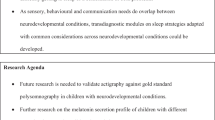Abstract
Background
Sleep problems are more common amongst children with intellectual disability than other children. The implications for families, teachers and classmates, as well as the children themselves, are profound.
Aim
A cross-sectional survey was undertaken with parents of children with intellectual disabilities in county Donegal. The aim was to examine the prevalence and types of sleep disorder in this group and to explore associated child and family characteristics.
Results
The response rate was 82.6%, with 96.8% meeting the criteria for a sleep disorder. This was higher than in other studies of children with and without intellectual disability or a diagnosed sleep disorder.
Conclusion
Our findings underscore the need for an increased awareness amongst health and social care professionals of the extent and nature of the problem, as well as intervention options. A co-ordinated approach to detection and intervention is discussed and recommendations are made for future research in this area.

Similar content being viewed by others
Notes
Five questionnaires were subsequently excluded from the analysis as they were from parents of children older than the study age range of 3–12 years.
An overall CSHQ score can only be calculated when every item on the questionnaire has been completed. Thirty-one respondents met this requirement.
References
Rona RJ, Li L, Guillford MC, Chinn S (1998) Disturbed sleep: effects of sociocultural factors and illness. Arch Dis Child 78:20–25. doi:10.1136/adc.78.1.20
Owens JA, Spirito A, McGuinn M, Nobile C (2000) Sleep habits and sleep disturbance in elementary school-aged children. J Dev Behav Pediatr 21:27–36. doi:10.1097/00004703-200002000-00004
Richdale AL (2003) A descriptive analysis of sleep behaviour in children with Fragile X. J Intellect Dev Disabil 28:135–144. doi:10.1080/1366825031000147076
Bartlett B, Rooney V, Spedding S (1985) Nocturnal difficulties in a population of mentally handicapped children. J Intellect Disabil Res 31:537–547
Wiggs L, Stores G (1996) Severe sleep disturbance and daytime challenging behaviour in children with severe learning disabilities. J Intellect Disabil Res 40:518–528. doi:10.1111/j.1365-2788.1996.tb00662.x
Sadeh A, Gruber R, Raviv A (2003) The effects of sleep restriction and extension on school-age children: what a difference an hour makes. Child Dev 74:444–445. doi:10.1111/1467-8624.7402008
Didden R, Korzilius H, Van Aperlo B, Van Overloop C, deVries M (2002) Sleep problems and daytime problem behaviours in children with intellectual disability. J Intellect Disabil Res 46(7):537–541. doi:10.1046/j.1365-2788.2002.00404.x
Pain H (1998) Coping with a child with disabilities from the parent’ perspective: the function of information. Child Care Health Dev 25(4):299–313. doi:10.1046/j.1365-2214.1999.00132.x
Lam P, Hiscock H, Wake M (2003) Outcomes of infant sleep problems: a longitudinal study of sleep, behavior, and maternal well-being. Pediatrics 111:203–207. doi:10.1542/peds.111.3.e203
Moore PJ, Adler NE, Williams DR, Jackson JS (2002) Socio-economic status and health: the role of sleep. Psychosom Med 64:377–344. Available on: http://www.psychosomaticmedicine.org/cgi/content/full/64/2/337
Quine L (1991) Sleep problems in children with mental handicap. J Ment Defic Res 35:269–290
Department of Health and Children (2001) Quality and fairness: a health system for you. Department of Health and Children, Dublin
Thackeray EJ, Richdale AL (2002) The Behavioural treatment of sleep difficulties in children with intellectual disabilities. Behav Intervent 17:211–231
Owens J, Maxim R, McGuin M, Nobile C, Msall M, Alario A (1999) Television-viewing habits and sleep disturbance in school children. Pediatrics 104:27–35
Didden R, Curfs L, Sikkema S, deMoor J (1998) Functional assessment and treatment of sleeping problems with developmentally disabled children: Six case studies. J Behav Ther Exp Psychiatry 29:85–97
Durand MV, Gernert-Dott P, Mapstone E (1996) Treatment of sleep disorders in children with developmental disabilities. J Assoc Pers Severe 21:114–122
Piazza CC, Fisher W (1991) A faded bedtime with response cost protocol for treatment of multiple sleep problems in children. J Appl Behav Anal 24:129–140
Stores G (2003) Medication for sleep-wake disorders. Arch Dis Child 88:899–903
Gormley P (2003) Identification of the health care needs of families who have a young child with profound or severe intellectual disabilities within the community. Unpublished Masters thesis, Royal College of Surgeons, Ireland
Paavonen EJ, Aronen ET, Moilanen I, Piha J, Rasanen E, Tamminen T et al (2000) Sleep problems of school-aged children: a complimentary view. Acta Paediatr 89:223–228
Author information
Authors and Affiliations
Corresponding author
Rights and permissions
About this article
Cite this article
MacCrosain, A.M., Byrne, M.C. Are we ignoring the problem of sleep disorder in children with intellectual disabilities?. Ir J Med Sci 178, 427–431 (2009). https://doi.org/10.1007/s11845-009-0321-9
Received:
Accepted:
Published:
Issue Date:
DOI: https://doi.org/10.1007/s11845-009-0321-9




